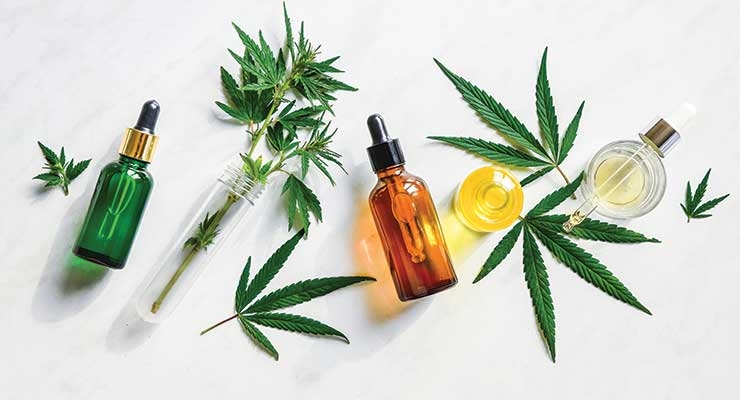By Virginia Lee, Brightfield Group 04.03.20
The emergence of CBD (cannabidiol) into the mainstream is having a big impact in the U.S., with top-line sales of hemp-derived CBD products reaching $4.2 billion in 2019, a 562% increase over 2018, according to the Brightfield Group. While few consumers outside of cannabis-friendly states such as California, Colorado and Oregon had heard of CBD prior to 2018, the passing of the Farm Bill in December 2018 brought national awareness of CBD and its potential health benefits. By removing hemp from the legal definition of marijuana and therefore from the Schedule 1 Controlled Substances list, the 2018 Farm Bill allowed licensed farmers nationwide to grow industrial hemp more freely and brought legitimacy to the U.S. CBD industry, driving consumer confidence and bringing large chain retailers into the CBD space.
Hemp or Marijuana?
To allay consumer confusion surrounding CBD, hemp and marijuana, CBD companies have been actively explaining the difference between hemp and marijuana as well as the difference between CBD and THC (tetrahydrocannabinol). Hemp and marijuana are related in that they are both strains of the Cannabis sativa plant species. However, hemp is grown for industrial uses such as food, fiber or CBD, and is defined as plant Cannabis sativa L. with a THC concentration of no more than 0.3% by dry weight under the 2018 Farm Bill. In contrast, marijuana is grown for medical or recreational use and is rich in THC. Cannabidiol is one of over 100 naturally-occurring cannabinoids found in hemp and is non-intoxicating while THC is a psychoactive cannabinoid that produces a “high.”
Growth Drivers
CBD’s exponential growth is being driven by a number of factors including a desire for natural alternatives to pharmaceuticals, expanded product availability, growing consumer awareness of CBD, and a wider and more sophisticated selection of products. General anti-pharma sentiment, the news surrounding the opioid crisis, and the growing self-care movement is driving consumers to look for natural remedies including CBD to treat conditions such as pain, anxiety and insomnia.
The entrance of large chain retailers such as CVS, Walgreens, Kroger and Albertsons into the CBD space in select states in 2019 helped to expand consumer awareness of CBD. Rapid expansion of CBD specialist stores such as CBD American Shaman, Your CBD Store, Seventh Sense Botanical Therapy (Green Growth Brands) and CBD Kratom is also familiarizing more Americans about CBD’s benefits as employees at these chain stores and at independently-owned CBD stores offer personalized CBD usage suggestions and, in some cases, the ability to sample products in the store.
Prior to the 2018 Farm Bill, CBD was mostly found in smoke and vape shops, dispensaries and independent health food stores along with a few early entrants such as Fresh Thyme Farmers Market and Lucky’s. In addition to family and friends, consumers are learning about CBD from TV and print media, social media and advertisements as athletes and other celebrities such as former New England Patriot Rob Gronkowski, PGA golfer Bubba Watson, Olympic medalists Megan Rapinoe, Kerri Walsh Jennings and Lolo Jones; musician Toni Braxton, and actress Alison Brie now feel comfortable endorsing CBD. Media personality Kim Kardashian made headlines for hosting a CBD-themed baby shower in April 2019 for the birth of her fourth child where her guests enjoyed CBD-infused chocolates and kombuchas, made their own CBD-infused bath oils and bath salts, and received CBD oil massages.
Leading CBD Categories
Beauty and skin care products, capsules and drinks are fast-growing CBD categories to watch. The explosion of CBD skin care products, from $17 million in 2018 to $311 million in 2019, is not a surprise as the majority of national retail chains are choosing to stock topicals and skin care products only as the U.S. Food and Drug Administration has stated that CBD cannot be marketed as a dietary supplement or added to food and beverages in interstate commerce.
Growth is also being supported by rapid innovation in skin care with leading players such as CBDfx, Balanced Health Botanicals (BOTA Hemp) and Bluebird Botanicals launching skin care products in 2019. Skin care- and beauty-focused brands like Sagely Naturals are launching items and expanding distribution into multiple channels including department stores (Lord & Taylor, Neiman Marcus and Nordstrom), national pharmacy chains (CVS, Walgreens) and beauty specialists (Ulta Beauty).
Glam Users, defined as brand-driven women who are more likely to spend more per product, are turning to CBD as they look for novel products and effective skin care alternatives for acne and anti-aging. Many of these Glam Users are seeking out “clean” products, with many CBD skin care and beauty companies launching products with no parabens, phthalates, sulfates or artificial dyes.
Despite the FDA not allowing the sale of CBD as dietary supplements, 2019 sales of CBD capsules grew 526% to reach $477 million. Growth is being driven by both leading CBD companies as well as long-time dietary supplements companies which are entering the CBD capsules space. CBD capsules provide an easy-to-use, dosage-controlled, discreet option. Companies are combining CBD with other botanical ingredients to address specific needs such as relaxation, sleep and menstrual pain. Supplements maker Garden of Life combines CBD with L-Theanine from organic green tea extract and organic saffron in its CBD Relax softgel. Irwin Naturals, another supplements leader, combines CBD with melatonin, L-Theanine, calcium and magnesium in its CBD + Power To Sleep Liquid Soft-Gel. Leading CBD company Medterra combines CBD with valerian root and cramp bark for menstrual pain relief in its Women’s Monthly Wellness gel cap.
Sales of CBD drinks continue to soar, along with the rate of innovation. Sales of CBD drinks rose 1,276% last year to $143 million in 2019. From sparkling waters and teas to lemonades and sports drinks, new innovations are satisfying the growing consumer demand for this familiar and convenient format. CBD drinks sales are benefitting from increasing demand for functional beverages, as CBD-infused drinks can offer relaxation, enhance energy and sleep, and workout recovery benefits. Despite the reluctance of large chain retailers to carry CBD drinks, CBD beverage companies like Recess, Tempo Beverages and Weller have been able to gain entrance into health food stores and foodservice outlets as well as build direct-to-consumer e-commerce sales by investing in digital marketing, social media initiatives, pop-ups and event marketing to reach consumers and influencers.
Who’s Using CBD and Why?
Brightfield Group’s consumer insights research shows that, overall, CBD users are more likely to be women, parents and Millennials. Women comprise 52% of CBD users, and 62% are parents, with 48% having children at home. Millennials are avid users of CBD, with 50% of CBD users between the ages of 21 and 40. Many are regular users, with 50% saying they use CBD two or more times a week. Consumers are using CBD as a natural alternative to treat a variety of ailments, with anxiety, chronic pain, depression, insomnia and inflammation being the top five medical conditions for which CBD is used.
Strong Growth Ahead
In the likely case that the FDA creates a regulatory framework for CBD usage in supplements, food and drinks, and the mainstream market continues to embrace hemp-derived CBD, the U.S. CBD market is expected to grow exponentially, reaching $24.3 billion by 2025. Hemp-derived CBD is a very versatile ingredient and is believed to have multiple benefits including pain relief, anxiety reduction and sleep enhancement, as well as anti-inflammatory and anti-acne properties, among others. In turn, CBD products can meet consumer demands for a natural alternative to pharmaceuticals as well as appeal to Glam Users looking for anti-acne and anti-aging skin care solutions and Millennials looking to relax with a CBD sparkling water.
Virginia Lee is the CBD Research Manager at Brightfield Group where she helps CBD and consumer packaged goods companies with strategic planning by developing and executing syndicated research on the U.S. CBD market. Brightfield Group is a leading consumer insights and market intelligence firm for the CBD and Cannabis industries. Prior to joining Brightfield Group, Lee worked at Euromonitor International and Innova Market Insights, where she advised global companies on innovation and market entry opportunities in beauty & personal care, packaged foods and non-alcoholic drinks. For more info: vlee@brightfieldgroup.com; Website: www.brightfieldgroup.com.
Hemp or Marijuana?
To allay consumer confusion surrounding CBD, hemp and marijuana, CBD companies have been actively explaining the difference between hemp and marijuana as well as the difference between CBD and THC (tetrahydrocannabinol). Hemp and marijuana are related in that they are both strains of the Cannabis sativa plant species. However, hemp is grown for industrial uses such as food, fiber or CBD, and is defined as plant Cannabis sativa L. with a THC concentration of no more than 0.3% by dry weight under the 2018 Farm Bill. In contrast, marijuana is grown for medical or recreational use and is rich in THC. Cannabidiol is one of over 100 naturally-occurring cannabinoids found in hemp and is non-intoxicating while THC is a psychoactive cannabinoid that produces a “high.”
Growth Drivers
CBD’s exponential growth is being driven by a number of factors including a desire for natural alternatives to pharmaceuticals, expanded product availability, growing consumer awareness of CBD, and a wider and more sophisticated selection of products. General anti-pharma sentiment, the news surrounding the opioid crisis, and the growing self-care movement is driving consumers to look for natural remedies including CBD to treat conditions such as pain, anxiety and insomnia.
The entrance of large chain retailers such as CVS, Walgreens, Kroger and Albertsons into the CBD space in select states in 2019 helped to expand consumer awareness of CBD. Rapid expansion of CBD specialist stores such as CBD American Shaman, Your CBD Store, Seventh Sense Botanical Therapy (Green Growth Brands) and CBD Kratom is also familiarizing more Americans about CBD’s benefits as employees at these chain stores and at independently-owned CBD stores offer personalized CBD usage suggestions and, in some cases, the ability to sample products in the store.
Prior to the 2018 Farm Bill, CBD was mostly found in smoke and vape shops, dispensaries and independent health food stores along with a few early entrants such as Fresh Thyme Farmers Market and Lucky’s. In addition to family and friends, consumers are learning about CBD from TV and print media, social media and advertisements as athletes and other celebrities such as former New England Patriot Rob Gronkowski, PGA golfer Bubba Watson, Olympic medalists Megan Rapinoe, Kerri Walsh Jennings and Lolo Jones; musician Toni Braxton, and actress Alison Brie now feel comfortable endorsing CBD. Media personality Kim Kardashian made headlines for hosting a CBD-themed baby shower in April 2019 for the birth of her fourth child where her guests enjoyed CBD-infused chocolates and kombuchas, made their own CBD-infused bath oils and bath salts, and received CBD oil massages.
Leading CBD Categories
Beauty and skin care products, capsules and drinks are fast-growing CBD categories to watch. The explosion of CBD skin care products, from $17 million in 2018 to $311 million in 2019, is not a surprise as the majority of national retail chains are choosing to stock topicals and skin care products only as the U.S. Food and Drug Administration has stated that CBD cannot be marketed as a dietary supplement or added to food and beverages in interstate commerce.
Growth is also being supported by rapid innovation in skin care with leading players such as CBDfx, Balanced Health Botanicals (BOTA Hemp) and Bluebird Botanicals launching skin care products in 2019. Skin care- and beauty-focused brands like Sagely Naturals are launching items and expanding distribution into multiple channels including department stores (Lord & Taylor, Neiman Marcus and Nordstrom), national pharmacy chains (CVS, Walgreens) and beauty specialists (Ulta Beauty).
Glam Users, defined as brand-driven women who are more likely to spend more per product, are turning to CBD as they look for novel products and effective skin care alternatives for acne and anti-aging. Many of these Glam Users are seeking out “clean” products, with many CBD skin care and beauty companies launching products with no parabens, phthalates, sulfates or artificial dyes.
Despite the FDA not allowing the sale of CBD as dietary supplements, 2019 sales of CBD capsules grew 526% to reach $477 million. Growth is being driven by both leading CBD companies as well as long-time dietary supplements companies which are entering the CBD capsules space. CBD capsules provide an easy-to-use, dosage-controlled, discreet option. Companies are combining CBD with other botanical ingredients to address specific needs such as relaxation, sleep and menstrual pain. Supplements maker Garden of Life combines CBD with L-Theanine from organic green tea extract and organic saffron in its CBD Relax softgel. Irwin Naturals, another supplements leader, combines CBD with melatonin, L-Theanine, calcium and magnesium in its CBD + Power To Sleep Liquid Soft-Gel. Leading CBD company Medterra combines CBD with valerian root and cramp bark for menstrual pain relief in its Women’s Monthly Wellness gel cap.
Sales of CBD drinks continue to soar, along with the rate of innovation. Sales of CBD drinks rose 1,276% last year to $143 million in 2019. From sparkling waters and teas to lemonades and sports drinks, new innovations are satisfying the growing consumer demand for this familiar and convenient format. CBD drinks sales are benefitting from increasing demand for functional beverages, as CBD-infused drinks can offer relaxation, enhance energy and sleep, and workout recovery benefits. Despite the reluctance of large chain retailers to carry CBD drinks, CBD beverage companies like Recess, Tempo Beverages and Weller have been able to gain entrance into health food stores and foodservice outlets as well as build direct-to-consumer e-commerce sales by investing in digital marketing, social media initiatives, pop-ups and event marketing to reach consumers and influencers.
Who’s Using CBD and Why?
Brightfield Group’s consumer insights research shows that, overall, CBD users are more likely to be women, parents and Millennials. Women comprise 52% of CBD users, and 62% are parents, with 48% having children at home. Millennials are avid users of CBD, with 50% of CBD users between the ages of 21 and 40. Many are regular users, with 50% saying they use CBD two or more times a week. Consumers are using CBD as a natural alternative to treat a variety of ailments, with anxiety, chronic pain, depression, insomnia and inflammation being the top five medical conditions for which CBD is used.
Strong Growth Ahead
In the likely case that the FDA creates a regulatory framework for CBD usage in supplements, food and drinks, and the mainstream market continues to embrace hemp-derived CBD, the U.S. CBD market is expected to grow exponentially, reaching $24.3 billion by 2025. Hemp-derived CBD is a very versatile ingredient and is believed to have multiple benefits including pain relief, anxiety reduction and sleep enhancement, as well as anti-inflammatory and anti-acne properties, among others. In turn, CBD products can meet consumer demands for a natural alternative to pharmaceuticals as well as appeal to Glam Users looking for anti-acne and anti-aging skin care solutions and Millennials looking to relax with a CBD sparkling water.
Virginia Lee is the CBD Research Manager at Brightfield Group where she helps CBD and consumer packaged goods companies with strategic planning by developing and executing syndicated research on the U.S. CBD market. Brightfield Group is a leading consumer insights and market intelligence firm for the CBD and Cannabis industries. Prior to joining Brightfield Group, Lee worked at Euromonitor International and Innova Market Insights, where she advised global companies on innovation and market entry opportunities in beauty & personal care, packaged foods and non-alcoholic drinks. For more info: vlee@brightfieldgroup.com; Website: www.brightfieldgroup.com.






